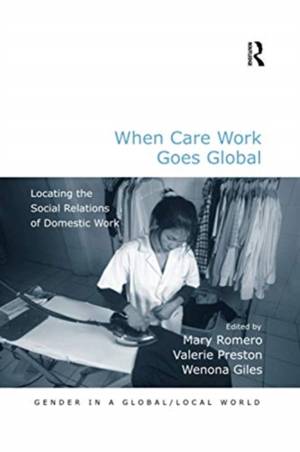
Door een staking bij bpost kan je online bestelling op dit moment iets langer onderweg zijn dan voorzien. Dringend iets nodig? Onze winkels ontvangen jou met open armen!
- Afhalen na 1 uur in een winkel met voorraad
- Gratis thuislevering in België vanaf € 30
- Ruim aanbod met 7 miljoen producten
Door een staking bij bpost kan je online bestelling op dit moment iets langer onderweg zijn dan voorzien. Dringend iets nodig? Onze winkels ontvangen jou met open armen!
- Afhalen na 1 uur in een winkel met voorraad
- Gratis thuislevering in België vanaf € 30
- Ruim aanbod met 7 miljoen producten
Zoeken
When Care Work Goes Global
Locating the Social Relations of Domestic Work
€ 83,95
+ 167 punten
Omschrijving
Women who migrate into domestic labour and care work are the single largest female occupational group migrating globally at present. Their participation in global migration systems has been acknowledged but remains under-theorized. Specifically, the impacts of women migrating into care work in the receiving as well as the sending societies are profound, altering gendered aspects of both societies. We know that migration systems link the women who migrate and the households and organizations that employ domestic and care workers, but how do these migration systems work, and more importantly, what are their impacts on the sending as well as the receiving societies? How do sending and receiving societies regulate women's migration for care work and how do these labour market exchanges take place? How is reproductive labour changed in the receiving society when it is done by women who are subject to multifaceted othering/racializing processes? A must buy acquisition, When Care Work Goes Global will be an extremely valuable addition for course adoption in migration, labour and gender courses taught in Sociology, Anthropology, Geography, Women's Studies, Area Studies, and International Development Studies.
Specificaties
Betrokkenen
- Uitgeverij:
Inhoud
- Aantal bladzijden:
- 332
- Taal:
- Engels
- Reeks:
Eigenschappen
- Productcode (EAN):
- 9780367600471
- Verschijningsdatum:
- 30/06/2020
- Uitvoering:
- Paperback
- Formaat:
- Trade paperback (VS)
- Afmetingen:
- 156 mm x 234 mm
- Gewicht:
- 467 g

Alleen bij Standaard Boekhandel
+ 167 punten op je klantenkaart van Standaard Boekhandel
Beoordelingen
We publiceren alleen reviews die voldoen aan de voorwaarden voor reviews. Bekijk onze voorwaarden voor reviews.










